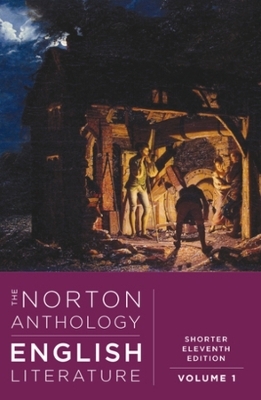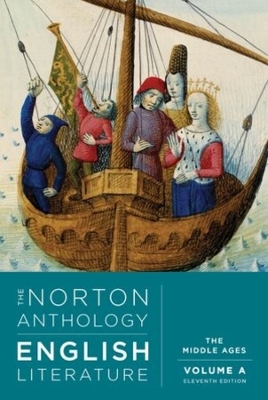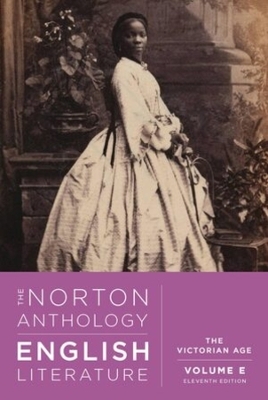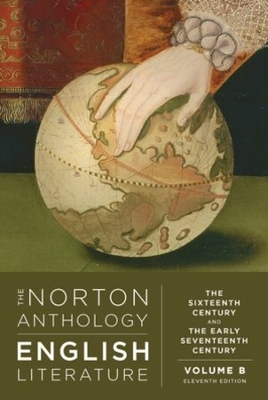
The Norton Anthology of English Literature
WW Norton & Co
978-1-324-06292-9 (ISBN)
From the Middle Ages to the twenty-first century, The Norton Anthology of English Literature, Shorter Eleventh Edition, showcases exciting new authors, works, and textual clusters that demonstrate the relevance of literature to contemporary students and trace the creative arc that has yielded the ever-changing and ever-fascinating body of material called English literature. This anthology offers the experience of literature as part of the world—not apart from it. It is also now available in ebook format for the complete anthology. The Norton Ebook Reader platform provides an active reading environment that equips students with tools for placing works within their social and historical contexts.
Stephen Greenblatt (Ph.D. Yale) is Cogan University Professor of the Humanities at Harvard University. Also General Editor of The Norton Anthology of English Literature, he is the author of eleven books, including Tyrant, The Rise and Fall of Adam and Eve: The Story that Created Us, The Swerve: How the World Became Modern (winner of the 2011 National Book Award and the 2012 Pulitzer Prize); Shakespeare's Freedom; Will in the World: How Shakespeare Became Shakespeare; Hamlet in Purgatory; Marvelous Possessions: The Wonder of the New World; Learning to Curse: Essays in Early Modern Culture; and Renaissance Self-Fashioning: From More to Shakespeare. He has edited seven collections of criticism, including Cultural Mobility: A Manifesto, and is a founding coeditor of the journal Representations. His honors include the MLA’s James Russell Lowell Prize, for both Shakespearean Negotiations: The Circulation of Social Energy in Renaissance England and The Swerve, the Sapegno Prize, the Distinguished Humanist Award from the Mellon Foundation, the Wilbur Cross Medal from the Yale University Graduate School, the William Shakespeare Award for Classical Theatre, the Erasmus Institute Prize, two Guggenheim Fellowships, and the Distinguished Teaching Award from the University of California, Berkeley. He was president of the Modern Language Association of America and is a fellow of the American Academy of Arts and Sciences, the American Philosophical Society, and the American Academy of Arts and Letters, and Arcadia—Accademia Letteraria Italiana. Julie Orlemanski (Ph.D. Harvard), The Middle Ages, is Director of Graduate Studies and Associate Professor of English at the University of Chicago. She teaches and write about texts from the late Middle Ages and theoretical and methodological questions in present-day literary studies. She is also co-editor of postmedieval: a journal of medieval cultural studies. Her book Symptomatic Subjects: Bodies, Medicine, and Causation in the Literature of Late Medieval England considers embodiment in the historical period just prior to medicine’s modernity. She is currently working on a book entitled Things Without Faces: Prosopopoeia in Medieval Writing, which is a new account of literary person-making, beginning with twelfth-century innovations in devotional imagery and speculative allegory and continuing to the reinvention of those figural techniques in the French and English poetry of the two centuries following. Courtney Weiss Smith (Ph.D. Washington Unversity), The Restoration and the Eighteenth Century, is Associate Professor of English at Wesleyan University and Associate Editor at History & Theory. Her first book, Empiricist Devotions: Science, Religion, and Poetry in Early Eighteenth-Century England (2016), won the Walker Cowen Memorial Prize for outstanding scholarship in eighteenth-century studies. She is currently writing Sound Stuff: Words in Enlightenment Philosophy and Poetics, a history of ideas about poetic sound (including rhyme, onomatopoeia, pun, and polyptoton). Tiffany Stern (Ph.D. Cambridge), The Sixteenth Century, is Professor of Shakespeare and Early Modern Drama at the University of Birmingham. Her work combines literary criticism, theatre and book history and editing from the sixteenth to the eighteenth centuries. In particular, she studies the theatrical contexts that brought about plays by Shakespeare and others. As General Editor of the New Mermaids play series and Arden Shakespeare 4, she looks at the way plays were manifested in manuscript and print, and at how to rethink editing for the digital age. She is currently at work on a book on early modern theatre and popular entertainment, Playing Fair, a book on Shakespeare Beyond Performance, looking at the theatrical documents produced in the light of a play’s performance, and an edition of Shakespeare’s Tempest. Katharine Eisaman Maus (Ph.D. Johns Hopkins), The Early Seventeenth Century, is James Branch Cabell Professor of English at the University of Virginia. She is the author of Being and Having in Shakespeare, Inwardness and Theater in the English Renaissance, and Ben Jonson and the Roman Frame of Mind; editor of a volume of Renaissance tragedies; and coeditor of The Norton Shakespeare, English Renaissance Drama: A Norton Anthology, and a collection of criticism on seventeenth-century English poetry. She has been awarded Guggenheim, Leverhulme, NEH, and ACLS fellowships, and the Roland Bainton Prize for Inwardness and Theater. Julie Crawford (Ph.D. University of Pennsylvania), The Early Seventeenth Century, is the Mark Van Doren Professor of Humanities at Columbia University. She works on sixteenth- and seventeenth-century English literature and culture and has written on Shakespeare, John Fletcher, Margaret Cavendish, the Sidneys, Anne Clifford, Margaret Hoby, and Mary Wroth, as well as on post-Reformation religious culture, the history of reading, and the history of sexuality. She is the author of Marvelous Protestantism: Monstrous Births in Post-Reformation England and Mediatrix: Women, Politics, and Literary Production in Early Modern England. She is currently completing a book entitled Margaret Cavendish's Political Career. Her articles have appeared in Studies in English Literature, English Literary History, Renaissance Drama, PMLA, Early Modern Culture, Huntington Library Quarterly, The Oxford Companion to Popular Print Culture, The History of British Women’s Writing, 1500–1610, and in a wide range of edited collections. James Noggle (Ph.D. UC Berkeley), The Restoration and the Eighteenth Century, is Professor of English at Wellesley College. He is the author of The Skeptical Sublime: Aesthetic Ideology in Pope and the Tory Satirists and The Temporality of Taste in Eighteenth-Century British Writing, and is completing a book called Unfelt Affect: Insensible Movements in Eighteenth-Century Literature. He is the recipient of fellowships from the National Endowment for the Humanities, the American Council of Learned Societies, and the American Philosophical Society. James Simpson (Ph.D. Cambridge), The Middle Ages, is Douglas P. and Katherine B. Loker Professor of English at Harvard University and former Chair of Medieval and Renaissance English at the University of Cambridge. An Honorary Fellow of the Australian Academy of the Humanities, he is the author of Piers Plowman: An Introduction to the B-Text; Sciences and the Self in Medieval Poetry; Reform and Cultural Revolution, 1350–1547; Volume 2 of The Oxford English Literary History; Burning to Read: English Fundamentalism and Its Reformation Opponents; and Under the Hammer: Iconoclasm in the Anglo-American Tradition. With Brian Cummings, he edited Cultural Reformations: Medieval and Renaissance in Literary History, and with Sarah Peverley John Hardyng’s Chronicle. His Reynard the Fox: A New Translation appeared in 2015.
| Erscheint lt. Verlag | 5.7.2024 |
|---|---|
| Mitarbeit |
General-Herausgeber: Stephen Greenblatt |
| Verlagsort | New York |
| Sprache | englisch |
| Maße | 150 x 231 mm |
| Gewicht | 1086 g |
| Themenwelt | Literatur ► Anthologien |
| Literatur ► Romane / Erzählungen | |
| Geisteswissenschaften ► Sprach- / Literaturwissenschaft ► Anglistik / Amerikanistik | |
| Geisteswissenschaften ► Sprach- / Literaturwissenschaft ► Literaturwissenschaft | |
| ISBN-10 | 1-324-06292-4 / 1324062924 |
| ISBN-13 | 978-1-324-06292-9 / 9781324062929 |
| Zustand | Neuware |
| Informationen gemäß Produktsicherheitsverordnung (GPSR) | |
| Haben Sie eine Frage zum Produkt? |
aus dem Bereich


